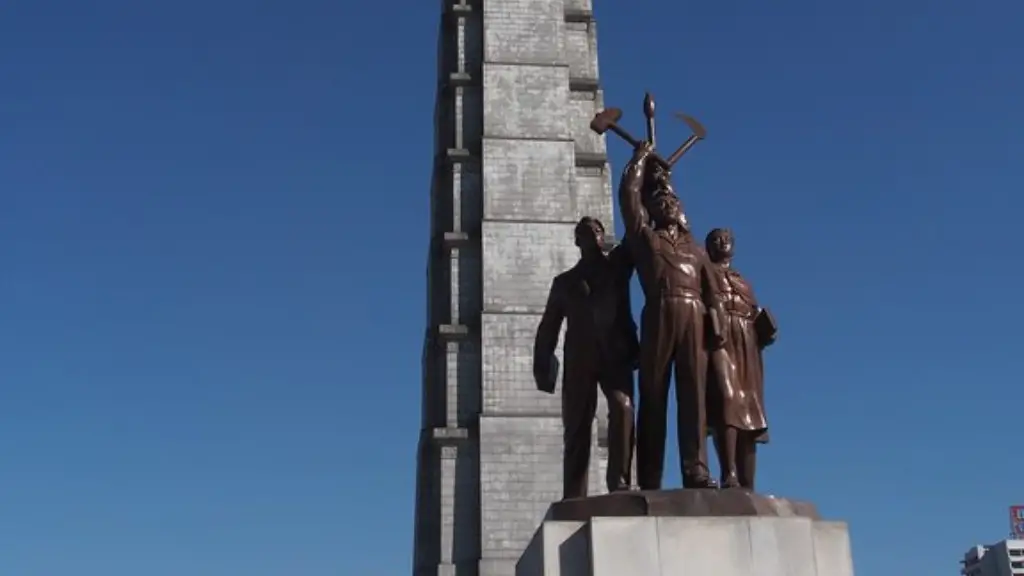Historical Background
North Korea and the United States have had a difficult relationship for over 70 years that dates back to the end of World War II and the creation of the state of Korea, divided between a Soviet-backed north and an American-backed south. The North Korean government has resisted the Western world’s attempt to infringe upon its sovereignty for decades, leading to recrimination and animosity on both sides. This deep-rooted mistrust, combined with a complex geopolitical situation, has led to North Korea and the United States firmly entrenched in an ongoing feud.
The roots of the North Korea-U.S. standoff can be traced back to the 1950-1953 Korean War, when the United States and its allies fought to repel the North Korean invasion of the South. At the war’s conclusion, an armistice was signed, but the details of a permanent peace treaty were never completed and the two sides remain technically in a state of war. The war was so damaging, however, that it ravaged North Korea’s infrastructure and deeply scarred the national psyche.
In the decades since, the North Korean political hierarchy has been dominated by the Kims – Kim Il Sung, his son Kim Jong Il, and his grandson Kim Jong Un – and the legacy of this family has been harsh repression, particularly of political dissent and freedom of expression. The North Korean Government has repeatedly denounced the United States for its interventions in the region and in international affairs, and accused it of trying to undermine its government.
Regional Status
The North Korean Government also views the United States as a threat to its regional status. North Korean leader Kim Jong Un has focused much of his energy on developing the nation’s nuclear weapons and ballistic missile programs. In response, the United States has led a wide-reaching campaign of international sanctions against the North Korean regime, depriving them of the resources and aid needed to continue their military buildup. These economic pressures have only further embittered the North Korean leadership and deepened their mistrust of the United States.
The United States is also a major obstacles in North Korea’s attempt to achieve regional dominance, due to its close military ties with South Korea and Japan. All three countries maintain a strong presence in the region, and the United States frequently holds maneuvers and other military exercises with its allies. These military activities, combined with increased numbers of U.S. ships in the region, are seen by the North Korean leadership as provocative moves to encircle the peninsula with American forces.
Power and Prestige
The North Korean government’s mistrust and anger towards the United States stems from its belief that the United States is trying to strip it of its power and prestige. North Korea claims that the United States is attempting to diminish its standing in the international community, which has been severely weakened in recent years due to its economic sanctions and lack of diplomatic ties with many countries. North Korea also views the United States as trying to influence the politics and foreign policy of the region, which it perceives as a challenge to its sovereignty.
Furthermore, the United State has repeatedly called on North Korea to end its nuclear weapons program, which Pyongyang sees as essential to its security. North Korea also believes that the United States is using the threat of economic sanctions and military force to pressure it into submission. For all of these reasons, North Korea deeply distrusts the United States and has sought to build up its own military capabilities in order to protect its sovereignty and carve out a secure place for itself in the international community.
Clash of Ideologies
North Korea and the United States also have conflicting political ideologies. North Korea is officially known as the Democratic People’s Republic of Korea, and is a one-party state that upholds a strictly enforced brand of communism. By contrast, the United States is a capitalist and democratic nation, and it is the most powerful democracy in the world. This dramatic ideological clash between the two nations has played a major role in their ongoing distrust and animosity.
The North Korean leadership also has a deep-seated hatred for the United States, stemming from decades of cultural and political domination by the Western world. North Korea deeply resents the long-standing domination of the West and feels that the United States is trying to impose its own values and beliefs on the nation. Pyongyang is also outraged by what it sees as American interference in its domestic politics, and the belief that the American government is trying to destabilize the country and overthrow the Kim family. This deep-seated resentment has been further exacerbated by the frequent American military exercises in the region and North Korea’s belief that the United States is trying to undermine its authority.
Domestic Propaganda
The North Korean Government has also used domestic propaganda to cultivate a negative image of the United States in the public’s mind. Throughout the years, Pyongyang has circulated a variety of anti-American messages through state-run media outlets and other forms of propaganda, in order to instill a deep resentment of the United States among its citizens.
North Korean leader Kim Jong-un has also taken a hard-line stance against the United States, praising its leaders in extremely derogatory terms. This stance has further cemented the idea that the United States is an enemy and a threat to North Korea in the minds of the people.
Relations with Other Nations
North Korea has taken a defiant stance in international relations with other nations as well. North Korea has recently engaged in military provocations with South Korea and Japan, nuclear tests, and other saber-rattling tactics meant to demonstrate its power and intimidate its neighbors. North Korea does not recognize the legitimacy of the government of South Korea and instead views it as a puppet of the United States. Most recently, North Korea has increased its level of aggression with the sinking of a South Korean warship and the shelling of a South Korean island.
Persistent international sanctions have also added to North Korea’s antagonism with the United States. In 2006, the United Nations Security Council imposed economic sanctions on North Korea in response to its nuclear tests and ballistic missile launches. These sanctions have severely weakened the North Korean economy, and the North Korean leadership has blamed the United States for orchestrating the sanctions and accuses it of trying to undermine their sovereignty.
Reasons Behind the Hostility
In conclusion, the hostility between the United States and North Korea can be attributed to a combination of factors. A long-standing mistrust, a conflicting geopolitical situation, and differing ideological principles have all played a part in the animosity between the two sides. North Korea’s fear of American-led attempts to interfere in its domestic politics and undermine its regional power has only worsened the situation, and North Korea has responded with a dangerous mixture of military provocations, nuclear tests, and domestic propaganda campaigns in order to emphasize its strength and unity.

